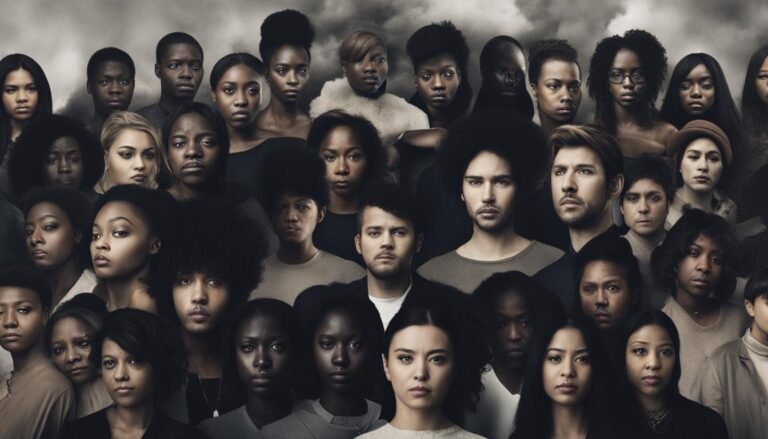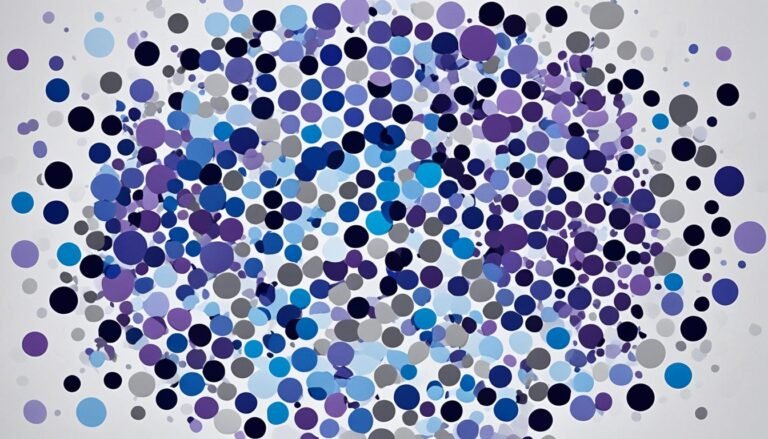What Does Depression Look Like in Black People?
Depression is a mental health condition that affects individuals regardless of their race or ethnicity. However, research has shown that the signs and symptoms of depression can vary among different racial and ethnic groups. In the case of black individuals, the manifestations of depression may differ from the traditional symptoms typically associated with the condition.
Black women, in particular, may experience symptoms such as sleep disturbances, self-criticism, and irritability, rather than the stereotypical signs of depressed mood. This variation in symptoms can make it challenging to recognize and diagnose depression in black individuals, leading to underdiagnosis and undertreatment within this population.
Key Takeaways:
- Depression symptoms in black individuals may differ from the stereotypical signs of depressed mood.
- Black women with depression may experience sleep disturbances, self-criticism, and irritability.
- Understanding the unique signs and symptoms of depression in black people is essential for providing appropriate care.
- Depression in black individuals can often be missed or underdiagnosed by healthcare providers.
- Recognizing and addressing depression in black communities is crucial for reducing mental health disparities.
Symptoms of Depression in Black Individuals
Black individuals with depression may exhibit a range of symptoms that can differ from person to person. It is important to recognize and understand these unique symptoms in order to identify and address depression in the black community.
Reported symptoms of depression in black women include:
- Somatic symptoms, such as fatigue, insomnia, and decreased libido
- Self-critical symptoms, including self-hate and self-blame
- Anhedonia, which is the inability to experience pleasure
- Irritability
It is crucial to note that depression symptoms in black individuals may not align with stereotypical signs of depressed mood or feelings of hopelessness. By recognizing and screening for these diverse symptoms, healthcare providers can better understand and address depression in the black community.
Creating awareness about the different presentations of depression in African Americans can help reduce the underdiagnosis and undertreatment of mental illness in black individuals.
Understanding the Unique Symptoms
The symptoms of depression in black individuals can often manifest as physical complaints, such as headaches or stomachaches, rather than purely emotional distress. This somatic presentation may be rooted in the historical and cultural experiences of black communities.
“The relationship between depression and somatic symptoms in black individuals may be influenced by cultural factors, such as the historical medical mistreatment of black people and the history of racial trauma.”
This quote highlights the importance of considering cultural and historical contexts when understanding and addressing mental health in black communities.
Diverse Presentations of Depression
Recognizing that depression can present differently in black individuals is essential for effective diagnosis and treatment. By acknowledging the diverse symptoms experienced within the black community, healthcare professionals can provide more targeted and appropriate care.
“Understanding and addressing the unique symptoms of depression in black individuals is crucial for promoting mental wellness and addressing mental health disparities.”
This quote emphasizes the need to prioritize mental health in the black community and ensure that individuals receive the support and care they need.
Mental Health Disparities in Black Communities
Black communities experience significant mental health disparities, including limited access to culturally sensitive and appropriate care. These disparities are influenced by various factors, such as racial trauma, discrimination, and barriers to accessing healthcare services.
Black individuals with depression often face unique challenges in seeking treatment. Stigma, prejudice, and myths surrounding mental health prevent many from reaching out for help, exacerbating the disparities in care.
Addressing these mental health disparities is crucial for promoting the well-being of black communities. It requires providing culturally competent care that understands and respects the unique experiences and needs of black individuals. Increasing awareness and promoting mental health education and support within the black community are also key to overcoming these disparities.
Creating a healthcare system that addresses the specific mental health needs of black individuals is essential for reducing the burden of depression and improving overall mental well-being in black communities.
The Impact of Racial Trauma and Discrimination
Racial trauma and discrimination significantly contribute to the mental health disparities experienced by black communities. Persistent exposure to racism and racial trauma can lead to chronic stress, anxiety, and depression. The daily experiences of systemic racism can erode mental well-being and contribute to a higher prevalence of mental health disorders in black individuals.
Barriers to Accessing Care
Barriers to accessing culturally competent care further perpetuate mental health disparities in black communities. These barriers include lack of affordable healthcare options, cultural insensitivity within the healthcare system, and limited availability of mental health services in black neighborhoods. As a result, many black individuals struggle to access the care they need to effectively address their mental health concerns.
Eliminating barriers to accessing quality mental healthcare is crucial for ensuring equitable and inclusive support for black communities.
Promoting Equity and Culturally Competent Care
To address mental health disparities in black communities, it is essential to prioritize equity and culturally competent care. Healthcare providers and mental health professionals must undergo cultural competency training to better understand and meet the unique needs and experiences of black individuals.
Community-based mental health programs, support groups, and outreach efforts tailored specifically for black communities can also play a crucial role in addressing mental health disparities. These initiatives provide a safe and inclusive space for individuals to seek support, access resources, and engage in conversations surrounding mental health.
By investing in culturally competent care and promoting mental health education and support, we can bridge the gap in mental healthcare and ensure that black communities receive the necessary resources to address depression and improve overall mental well-being.
Factors Contributing to Depression in Black People
Depression in black people is influenced by various factors that contribute to their increased risk of developing the condition. Understanding these factors is crucial for addressing depression in the black community and providing effective support and treatment.
Racial Trauma and Discrimination
Black individuals often face racial trauma and discrimination, which can have a profound impact on their mental health. Experiences of racism can lead to chronic stress, feelings of worthlessness, and a heightened risk of depression. The constant exposure to racial trauma can contribute to the development of depressive symptoms.
Difficult Life Circumstances
“For many Black individuals, difficult life circumstances influenced by systemic racism can exacerbate the risk of depression.”
Structural inequalities and socioeconomic disparities disproportionately affect black communities, resulting in challenging life circumstances that contribute to depressive symptoms. Limited access to quality education, employment opportunities, and affordable housing can create additional stressors that impact mental well-being.
Racial Barriers to Accessing Care
Racial barriers and disparities in accessing mental health care can further compound the risk of depression in black individuals. Factors such as limited availability of culturally sensitive services, lack of insurance coverage, and stigma surrounding mental health can prevent individuals from seeking the help they need.
Higher Exposure to Violence
Black individuals may experience higher exposure to various forms of violence, including community violence and police brutality. This exposure can lead to feelings of fear, powerlessness, and trauma, increasing the likelihood of developing depression.
Recognizing and addressing these factors is essential for understanding the unique challenges faced by black individuals and communities in relation to depression. By addressing systemic racism, promoting access to culturally competent care, and providing support for those affected by racial trauma, we can work towards addressing depression in the black community and improving mental health outcomes.

Challenges in Diagnosing and Treating Depression in Black People
Depression in people of color, particularly within the black community, presents unique challenges when it comes to diagnosis and treatment. These challenges can contribute to the underdiagnosis and undertreatment of depression in black individuals. Racial stereotypes and healthcare disparities often contribute to the misdiagnosis or overlooking of depression symptoms in black people.
One of the main challenges is the failure of some healthcare providers to recognize or take the symptoms of depression in black individuals seriously. Due to cultural biases and stereotypes, depression symptoms in black people may be dismissed or attributed to other factors. This can result in inadequate or inappropriate treatment, further exacerbating the impact of depression on individuals’ lives.
The stigma surrounding mental health within the black community also plays a significant role in the challenges of addressing depression. Many individuals hesitate to seek help due to fear of judgment, misconceptions about mental illness, and cultural expectations of strength and resilience. The reluctance to seek treatment can delay early intervention, prolong suffering, and worsen the overall course of depression.
To address these challenges effectively, it is crucial to promote mental health awareness and education within the black community. By providing accurate information about depression, its symptoms, and available treatment options, individuals can make informed decisions about seeking help. Culturally competent care, provided by healthcare professionals who understand and respect the cultural nuances of black communities, is essential for accurate diagnosis and appropriate treatment.
Combating the stigma surrounding mental health is also paramount. Creating safe spaces for open dialogue, encouraging conversation about mental health, and challenging the stereotypes and misconceptions associated with it can help individuals feel more comfortable seeking the support they need.
By addressing these challenges head-on, we can work towards improving the diagnosis and treatment of depression in people of color, particularly in the black community. Investing in mental health resources, fostering cultural understanding within healthcare systems, and empowering individuals to prioritize their mental well-being can contribute to healthier and more resilient communities.
Barriers to Diagnosing and Treating Depression in Black People
| Barriers | Impact |
|---|---|
| Racial Stereotypes | Misdiagnosis and overlooking of depression symptoms |
| Healthcare Disparities | Limited access to culturally competent care |
| Stigma | Reluctance to seek help and delay in treatment |
| Lack of Mental Health Education | Limited awareness about depression and available resources |
| Cultural Expectations | Pressure to appear strong and resilient, hindering help-seeking |
Addressing Mental Health in Black Communities
Mental health in black communities is a pressing issue that requires targeted efforts and resources to overcome. To address the unique challenges faced by black individuals in relation to mental health, it is crucial to promote education, awareness, and improve access to culturally sensitive mental health resources.
One effective approach is the establishment of community-based programs specifically tailored to the needs and experiences of black individuals. These programs can provide a safe and supportive environment where individuals can access resources, seek guidance, and connect with others who share similar experiences. Support groups, both online and in-person, can also offer a valuable space for black individuals to share their stories, find understanding, and receive support from peers facing similar mental health struggles.
Therapy plays a crucial role in addressing mental health concerns in black communities. It is essential to ensure that mental health professionals receive proper training on cultural competency and sensitivity, enabling them to provide effective care to black individuals. Creating opportunities for therapists from diverse backgrounds to better understand the unique cultural nuances and perspectives of black communities helps foster trust and facilitates more meaningful therapeutic relationships.
Outreach efforts aimed at raising awareness about mental health in black communities are also vital. By partnering with community leaders, organizations, and influencers, we can work towards destigmatizing mental health discussions and encouraging individuals to seek help. Providing accurate information about depression and mental illness in people of color can help combat myths and misconceptions, empowering individuals to overcome internal and external barriers preventing them from seeking treatment.
Recognizing and addressing the systemic factors that contribute to mental health disparities is essential for achieving equitable and effective mental health support for black communities. Advocacy for policy changes, increased funding for mental health resources, and a commitment to dismantling systemic racism are fundamental steps towards improving mental health outcomes in black communities.
Key Actions to Address Mental Health in Black Communities:
- Promote education and awareness about mental health in black communities.
- Establish community-based programs tailored to the unique needs and experiences of black individuals.
- Support the creation of culturally competent therapy services.
- Encourage outreach efforts to destigmatize mental health and promote help-seeking behaviors.
- Advocate for policy changes and increased funding for mental health resources in black communities.

Addressing mental health in black communities requires a multi-faceted approach that encompasses education, awareness, access to resources, and policy changes. By prioritizing mental health and fostering a supportive environment, we can work towards improving the well-being and overall mental health outcomes for black individuals.
Conclusion
Depression in black people is a multifaceted issue influenced by various factors, including cultural, societal, and systemic elements. To effectively address depression in the black community, it is crucial to gain an understanding of the unique symptoms experienced by black individuals and to overcome healthcare disparities and stigma. Providing culturally competent care is essential in ensuring that mental health needs are properly addressed.
Black mental health disparities are prevalent, stemming from limited access to culturally sensitive and appropriate care. Factors such as racial trauma, discrimination, and barriers to accessing mental health resources contribute to these disparities. It is imperative to address these challenges by promoting mental health awareness and education, and by increasing access to tailored support programs within the black community.
By recognizing and addressing mental health disparities, we can work towards reducing the impact of depression in black communities. Improving overall mental health outcomes requires a comprehensive approach that includes providing equitable access to resources, combating stigma, and implementing culturally competent care practices. Through collective efforts, we can foster an environment where mental illness in black individuals is understood, supported, and addressed effectively.
FAQ
What are the signs of depression in black individuals?
Black individuals with depression may exhibit symptoms such as somatic symptoms (e.g., fatigue, insomnia, decreased libido), self-critical symptoms (e.g., self-hate, self-blame), anhedonia (inability to experience pleasure), and irritability. It is important to recognize that depression symptoms may not align with the stereotypical signs of depressed mood and feelings of hopelessness.
What are some mental health disparities faced by black communities?
Black communities face mental health disparities, including limited access to culturally sensitive and appropriate care. Factors such as racial trauma, discrimination, and barriers to accessing care contribute to these disparities. It is crucial to address these disparities by providing culturally competent care, increasing awareness, and promoting mental health education and support within the black community.
What factors contribute to depression in black people?
Factors such as exposure to racial trauma, difficult life circumstances influenced by racism, and racial barriers to accessing care contribute to depression in black people. Recognizing and addressing these factors is essential for understanding and mitigating the risk of depression in black communities.
What are the challenges in diagnosing and treating depression in black people?
Depression in black people is often misdiagnosed or overlooked due to racial stereotypes and healthcare disparities. Some healthcare providers may not recognize or take the symptoms of depression in black individuals seriously, leading to inadequate treatment. Stigma surrounding mental health in the black community can also deter individuals from seeking help. It is crucial to address these challenges by promoting mental health awareness, providing culturally competent care, and combating stigma.
How can mental health be addressed in black communities?
To address mental health in black communities, it is essential to promote education, awareness, and access to culturally sensitive mental health resources. This can include community-based programs, support groups, therapy, and outreach efforts tailored to the unique needs and experiences of black individuals. Recognizing and addressing the systemic factors that contribute to mental health disparities is crucial for achieving equitable and effective mental health support for black communities.






